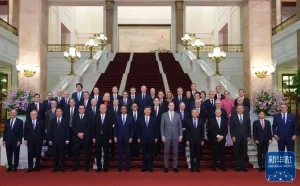The True Information Cocoon is Actually on Foreign Websites: What I Learned After Joining Rednote
【This article is translated from Simplified Chinese internet content and originally authored by Chinese social media influencer “Pingyuan Gongzi”】
Overnight, many users found their Rednote homepage flooded with Americans and Europeans.
These individuals identify themselves as “TikTok refugees,” claiming they are choosing another Chinese social app because TikTok is about to be banned by the U.S. government.
Since Rednote is a Chinese social platform with a single database, it doesn’t distinguish between domestic and international versions, and users from any part of the world can register using their phones, creating an amusing scene where Chinese and English speakers chat animatedly on the same platform. Americans exclaimed—”This is the real free world.”

This phenomenon even propelled Rednote to the top of the U.S. App Store download chart. Foreigners are busy experimenting with various translation tools, adding Chinese subtitles to their videos, and directly interacting with Chinese users.



Therefore, Chinese social software doesn’t need to specifically create an “international version” for foreigners; a multilingual, unrestricted communication platform is the correct path.
Don’t underestimate Americans; they also learn, read guides, and use translation tools. Just as we were patient in the past, they will be today.
The U.S. government’s ban on TikTok is pointless because domestic U.S. social apps lack competitiveness. Certain narrow-minded, consumer-disrespecting internet products cannot compete with top-tier apps that emerge from the world’s most liberal market… American netizens also find that, in the Chinese internet space, even characters like Luigi are heroes. Ordinary people’s values are similar, fostering mutual understanding.


Before Americans poured into Rednote, many internet users from Chinese-speaking regions like Taiwan, Singapore, and Malaysia had already flocked to it, as it’s highly functional for reading guides, browsing memes, shopping, and showcasing one’s lifestyle – an all-in-one solution even a fool would use.
Mostly composed of “fun-loving people,” these individuals find joy in helping Chinese students with their English homework in Chinese communities… This is true cultural exchange.

Some even discovered that Elon Musk’s mother already had an account onRednote, provoking various conspiracy theories and satire regarding stateless capitalists… People’s instincts and thoughts are similar worldwide, and so is their enjoyment.


Be confident; in the era of mobile internet, which Chinese internet product or social app doesn’t outperform the competition globally in terms of usability?
Judging by product design, apps like Weibo, Douyin, Kuaishou, Rednote, and even Zhihu would be a downgrade for American counterparts… On the other hand, X, Facebook, Instagram, YouTube, and Quora feel like relics of the past, not designed explicitly for the mobile internet users. Taiwan’s PTT, however, seems entirely unfathomable, like an “underworld design.”
Content-wise, the Simplified Chinese internet hosts the most diverse, free, and inclusive content globally, almost free from “political correctness.” You can openly support Russia or Ukraine, Israel or Palestine, be anti-American or pro-American, without any interference. Which Chinese website, app, or forum isn’t buzzing with heated arguments day and night, presenting diverse perspectives, and robust logic to argue their correctness and criticize others’ mistakes? There’s no single entity dominating the discourse; various ideologies and factions coexist fascinatingly.
Regarding resource richness, logical debate skills, and content brilliance, the Chinese internet ranks number one globally.
Conversely, so-called “foreign websites” are real “news bubbles.” English internet spaces are monopolized by American mainstream media, essentially regurgitating different versions of the same ideas, filled with universal value and political correctness, lacking innovation and fun. Traditional Chinese websites are saturated with outdated opinions, seemingly like a cesspool. They can’t offer an engaging experience after prolonged exposure.
Therefore, the future global discourse center won’t be elsewhere; it will reside in the “Chinese Internet”… Not to mention, Weibo is already teeming with foreigners, and the Iranian and U.S. embassies often engage in cyber confrontations within Chinese communities, with the Israeli and Russian embassies scrambling for supporters among Chinese netizens.
As the nation strengthens, there’s no need for deliberate “social app exportation” or “cultural export.” Eventually, China’s social software and online forums will evolve into “international versions” that facilitate seamless global communication.
During the Tang Dynasty, there was no need to flaunt its strength, territory, or poetry worldwide… Every nation learned Chinese and traveled far just to witness its splendor firsthand.
Editor: Zhongxiaowen



